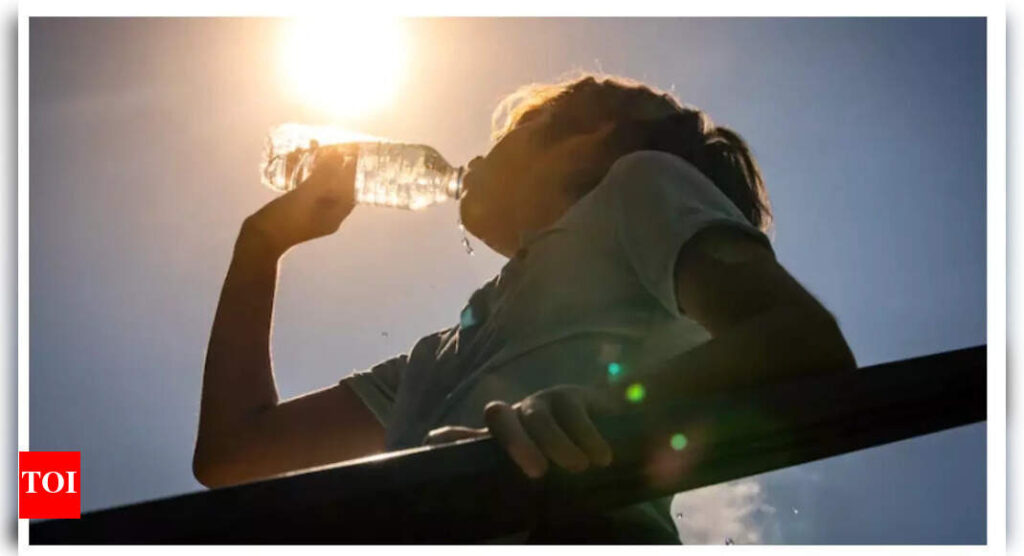Woman dies by drinking water like THIS; know all about the often fatal condition

Last year, a shocking incident came to the fore where a US woman died after drinking too much water! Yes that is true. The woman, identified as Ashley Summers, was celebrating the Fourth of July on a lake in Indiana when she started to feel extremely dehydrated, according to her brother, Devon Miller.Devon told Good Morning America, that his sister then started drinking a lot of water, and gulped down almost 16-ounce bottles of water in 20 minutes (roughly 2 litres) She then started feeling sick soon, and passed out in her home garage, later declared dead.

What really happenedAccording to doctors, Ashley passed away from water intoxication or water poisoning. The condition occurs when the body takes in more water than the kidneys can remove, upsetting the balance of important minerals in the blood. Let’s find out more..What is Water Intoxication?Water intoxication, also known as water poisoning or overhydration, occurs when you drink an excessive amount of water in a short time. Normally, your kidneys can filter and remove about 0.8 to 1 liter of water per hour. Drinking more than this overwhelms the kidneys’ ability to keep the body’s fluid and mineral balance stable.When too much water enters the bloodstream, it dilutes the concentration of sodium and other electrolytes. Sodium is a key mineral that helps control the balance of fluids inside and outside your body’s cells. When sodium levels fall too low, a condition called hyponatremia occurs. This causes water to move into the cells, making them swell.What Happens Inside Your Body?The swelling of cells due to excess water is especially dangerous in the brain. The skull is a hard, fixed space, so when brain cells swell, pressure inside the skull increases. This pressure can affect how the brain works, leading to symptoms like confusion, headache, nausea, and vomiting.If the pressure continues to rise, it can cause severe problems such as seizures, loss of consciousness, coma, brain damage, and even death. This swelling of the brain is called cerebral edema and is the most serious consequence of water intoxication.

Symptoms of Drinking Too Much WaterThe symptoms of water intoxication usually start mild but can quickly become severe if not treated. Early signs include:Nausea and vomitingHeadacheBloating or swellingConfusion or disorientationFatigue or tirednessAs the condition worsens, symptoms may progress to:Muscle weakness or crampsDrowsiness or difficulty staying awakeBlurred or double visionSeizuresLoss of consciousness or comaThese symptoms happen because the brain cells are swelling and the nervous system is not functioning properly.Why Is Drinking Too Much Water Dangerous?Water is essential for life, but like any substance, it can be harmful in excess. The main danger of drinking too much water quickly is the dilution of sodium in your blood. Sodium helps regulate fluid balance and nerve and muscle function. When sodium drops too low, your cells swell, and this can disrupt vital body systems.The kidneys can only process a limited amount of water per hour. Drinking water faster than the kidneys can handle leads to fluid buildup in the bloodstream and tissues. This overload causes the dangerous swelling of cells, especially in the brain.Who Is at Risk?Water intoxication is rare but can happen in certain situations:Endurance athletes and marathon runners: They may drink excessive water to stay hydrated during long events, risking hyponatremia.Military personnel in training: Intense physical activity combined with high water intake can lead to overhydration.People with mental health conditions: Some may compulsively drink large amounts of water.Use of certain drugs: Drugs like MDMA increase body temperature and thirst, leading to excessive water intake.Water-drinking contests or forced water consumption: These can cause rapid intake of dangerous amounts of water.How Much Water Is Too Much?There is no exact number that applies to everyone because factors like body weight, kidney health, activity level, and climate affect how much water you need. However, drinking more than about 1 liter of water per hour over several hours can increase the risk of water intoxication.How to Avoid Water IntoxicationPreventing water intoxication is simple if you follow these tips:Drink according to thirst: Your body naturally signals when it needs water. Don’t force yourself to drink large amounts if you’re not thirsty.Monitor urine color: Light yellow or pale straw color usually means good hydration. Completely clear urine may indicate overhydration.Adjust water intake based on activity and weather: You need more water when exercising or in hot weather, but balance it carefully.Use electrolyte drinks during intense exercise: These help maintain sodium levels and prevent dilution.Avoid water-drinking contests or forced consumption: These can be extremely dangerous.Be cautious if you have health conditions affecting kidneys or electrolyte balance.Disclaimer: This article is not intended to be substituted for medical advice. Please check with a doctor on the right way and amount to drink water, as per your body’s needsSourcesPMC Article – Fatal Water IntoxicationNational Center for Biotechnology Information (NCBI) – Hyponatremia from Excessive Water IntakeCase Study in Clinical Reports in Urology (Karger)Health.com – Water Intoxication: Symptoms, Causes, Treatment





